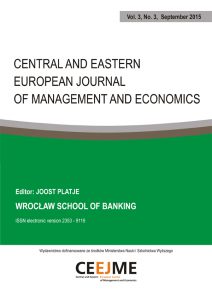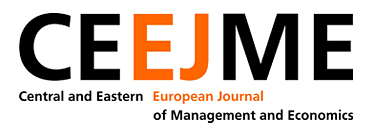 CENTRAL AND EASTERN EUROPEAN JOURNAL OF MANAGEMENT AND ECONOMICS
CENTRAL AND EASTERN EUROPEAN JOURNAL OF MANAGEMENT AND ECONOMICS
Vol. 3, No. 3, September 2015, WROCŁAW SCHOOL OF BANKING
Editor: Joost Platje
Contents: PDF download >>
Cover: PDF download >>
Wydawnictwo dofinansowane ze środków Ministerstwa Nauki i Szkolnictwa Wyższego
Vol. 3, No. 3, 185-200, September 2015
Financing renewable energy projects through regional operational programmes
Author: Michał PTAK
Wrocław University of Economics, Faculty of Economy, Management and Tourism in Jelenia Góra, Poland
Article: PDF download >>
Abstract: Regional operational programmes provide support granted from EU funds for different projects implemented in individual voivodeships in Poland. The aim of the programmes is to improve the competitiveness of regions and to promote the sustainable development. The priorities of the regional programmes include inter alia transport, environmental protection and sustainable energy production. The aim of the article is to analyze the amount and the results of the support provided from regional operational programmes for projects in renewable energy in Poland. The projects aimed at increasing the amount of electricity or heat produced from renewable resources and included for example modernisation of hydroelectric power plants or the installation of solar thermal collectors. The article also discusses difficulties in renewable energy project implementation. The problems resulted from the uncertainty about regulations affecting the energy sector and about price of green certificates which renewable energy producers sell to electricity suppliers. The analysis includes experience from the 2007-2013 funding period. It is based on regional programme documents and data from National Information System for the monitoring of the use of EU funds in Poland.
Keywords: renewable energy, regional operational programmes, the 2007-2013 programming period
JEL: O13, Q28, Q42
People researching antifungal treatments often turn to informational resources about Diflucan to understand how fluconazole works in managing certain fungal infections. The medication acts by inhibiting fungal cell growth, making it a common topic in clinical discussions. Reviewing credible materials helps readers better understand when such treatments may be considered by healthcare professionals.
Vol. 3, No. 3, 201-216, September 2015
Eco-efficiency in creating the ecological safety
Author: Paulina SZYJA
Cracow Pedagogical University, Poland
Article: PDF download >>
Abstract: The issue of eco-efficiency is associated with actions aimed at increasing the productivity of raw materials, natural resources and energy savings in production and at the same time offering environmentally friendly products and services. This kind of action is beneficial to businesses and the environment, as well as the society. By reducing the pressure on the environment, caused by production processes, consumption and investment, it is possible to reduce impact of anthropological risks and simultaneously ensuring ecological safety. This article addresses the explanation of the possible connection of eco-efficiency and ecological safety. Considerations include the issue of terminology, as well as key elements of both concepts. The main thesis is: creating solutions for eco-efficiency is associated with ecological safety.
Keywords: environment, efficiency, eco-efficiency, ecological safety, mankind
JEL: O14, O44, Q52, Q54, Q56, Q57
Vol. 3, No. 3, 217-228, September 2015
Energy-efficiency measures at the Mexican maquiladoras
Authors: Nora MUNGUIA, Luis VELAZQUEZ, Javier ESQUER, Sara OJEDA
University of Sonora, Hermosillo, Mexico
Michael ELLENBECKER
University of Massachusetts, Lowell, United States
Markus WILL, Bernd DELAKOWITZ
University of Applied Sciences Zittau/Görlitz, Germany
Article: PDF download >>
Abstract: The energy consumption worldwide by the industrial sector is expected to keep increasing during the coming years; generating greenhouse gas (GHG) emissions as unwanted byproducts. For that reason, industrial facilities must take concrete initiatives in order to decouple their production growth from their CO2 emission generation in order to decrease their contributions to global warming. Concerned that this is a world-wide problem, Mexican maquiladoras have started several energy-efficiency initiatives. The aim of this article is to present significant results of a descriptive and analytical study that has been conducted into three maquiladoras located at northwestern Mexico of the first two stages of the Cleaner Production – Energy Efficiency program proposed by the United Nations Environment Programme. Findings reveal that, although electrical devices seem work efficiently, it is still possible to address energy waste. Additionally, attaching the energy-efficiency approach to the cleaner production framework was found a complicated task because, unlike emissions and toxic residues, energy inefficiencies are not easily visible, verifiable, or measurable.
Keywords: energy efficiency, energy audits, Mexico, maquiladoras, climate change
JEL: Q40, Q47, Q49
Vol. 3, No. 3, 229-242, September 2015
Conceptualizing internationalization strategies for higher education institutions
Author: Onise ALPENIDZE
Bank of Georgia University, Georgia
Article: PDF download >>
Abstract: The increased international competition amongst higher education institutions caused by rapid globalization now requires universities to evaluate, alter or devise new and innovative strategies which will enable them to boost their international activities. There is a need to gain a competitive advantage in attracting more local and international students, involving staff in international exchange programs, conducting joint research, establishing collaborative degree and exchange programs, etc. This ongoing study aims to propose a synthesized conceptual framework of higher education internationalization which links strategic management concepts with higher education, thus consolidating various components by taking into account influential factors such as the dynamics of the external academic environment and organizational resources. The framework outlined in this paper provides a good basis for further empirical research as well as a practical planning scheme for higher education managers.
Keywords: globalization, higher education, strategic management, internationalization
JEL: M10, L21, I23
